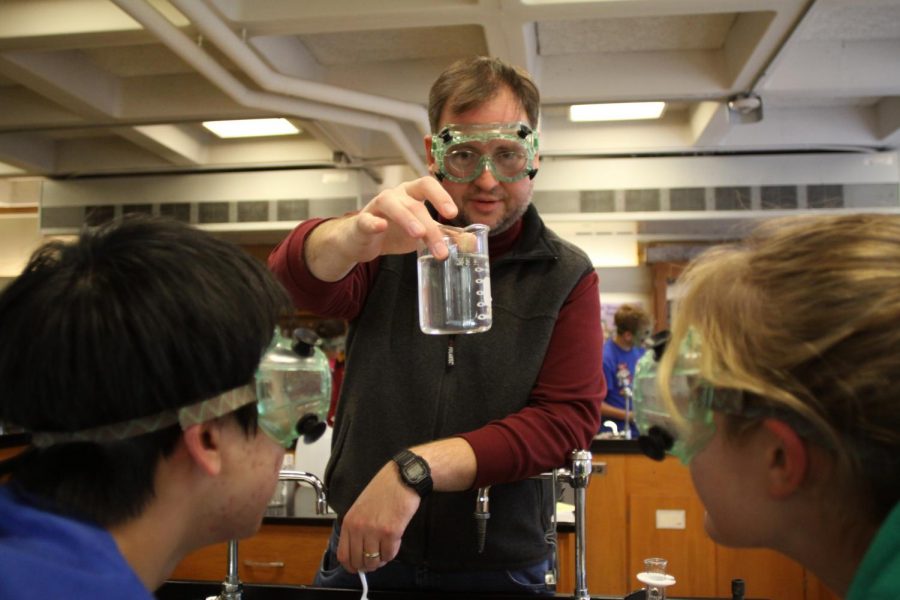Interview With Mr. de Grys
Mr. de Grys is our resident birdwatcher, course swapper, and Organic Chemistry teacher, but next year he will be trading his teaching title for that of Academic Dean. But what does this new title entail? I was fortunate enough to sit down with the man himself and ask all about his plans for next year. Some of the responses have been edited for clarity and length.
Julia R. ’20: Hi! How are you doing? Thanks so much for taking time to talk with me!
Hans de Grys: I’m doing well, thank you! No problem.
JR: So, tell me about what you’re up to currently and what will be happening next year!
HG: Currently, I have two jobs. I am a half time chemistry teacher, so I teach two sections of Organic Chemistry, and I’m half time Upper School assistant director. We have a full time assistant director, Ms. Benson; Ms. Maiorano and I are both half time assistant directors. So between the three of us we have two jobs.
JR: What does being an assistant director entail?
HG: We split up the jobs a bit. Ms. Maiorano works on clubs, student activities, and advising; Ms. Benson works on student support and discipline; and I work with curriculum, academics, and course sign ups and course changes.
JR: What will you be doing next year?
HG: Next year I’m going to be giving up my half time science teaching job and take on this new position of academic dean. This will also be a half time position and I’ll keep my half time assistant director position. Even though the academic dean and assistant director will be different jobs, there’ll be a lot of overlap because of my role in the Upper School already–working with academics and curriculum and course and scheduling. All those things will fit together nicely.
JR: That sounds like your jobs will go together well! What prompted this move to the more administrative side of things?
HG: I think a couple things. The first and most obvious is that Bernie asked me if I would be interested in this role. I said yes because I think, as teachers, we have a special privilege to work with students in classrooms–see how they grow as people and help teach them and provide that sort of direct educational experience. And when educators move into administration, I think part of their hope and goal is to broaden their reach. Help more students or help teachers become better teachers. Swim upstream in the educational process and have a bigger impact on the school.
JR: So then what will you be doing as academic dean? Do you have any plans?
HD: Well it’s not like I have a list of things to do, but I really want to–you probably know something about the reenvisioning process—help flesh that out and make that reality because I think that’s really important. The way we’ve been doing Lakeside is good, and students have really benefited from it, but especially in 2019 and moving forward, these things–skills competences and mindsets–that we’ve been talking about are just going to become more important. The focus on unstructured problem solving, creative thinking, cognitive flexibility, collaboration, and leadership, you know, all those different pieces are going to become more important. Like in Organic Chemistry, the point isn’t to learn all these reactions, the goal is to get at these more fundamental skills and habits of mind.
JR: That sounds amazing. What kind of things will you miss about teaching?
HG: Teaching is really fun! I enjoy spending time with students. I think for science teachers particularly, our job is to explore the world with our students and investigate things and try them out and just hang out and spend time with them and that’s fun, so I’ll definitely miss that.
JR: Do you have any plans to keep teaching in the future?
HG: Yes! I won’t be able to have a full time class just on my own, but I think my plan for next year is to partner up with another teacher and tag teach a class. Maybe that’ll be in science or in another discipline, but I don’t know! That will be exciting!
JR: Do you have a favorite teaching story?
HG: I think my favourite teaching stories are when students do something unexpected but brilliant and hilarious. Recently, when we started with the Veracross system, I needed to test that, so I created some new classes and made sure I could enroll students in those classes. I created this fake class called The Poetry of Quantum Electrodynamics, and I enrolled one of my students in it just to make sure that I knew how to add students and drop students and change all the settings. Then I got busy and distracted and never took that student out of the class. So when students got their final schedules right before school started, this class was still on his schedule. Instead of coming to me and saying, ‘I think there’s been some sort of mistake’, he started submitting assignments for this fake class, so I started getting these poetry assignments about quantum electrodynamics from this student. He clearly knew it was some sort of mistake, but he was humouring me and I loved the playfulness and the willingness to go along for the ride. That’s one of the things I really appreciate about Lakeside students–they are so creative and inventive and they’re game for anything. You say ‘We’re going to try this new crazy lab!’ and instead of saying ‘Oh that’s too hard,’ or ‘I don’t want to do that,’ they’re like, ‘Absolutely! Sign me up for that!’ And that’s what I love about working here.

